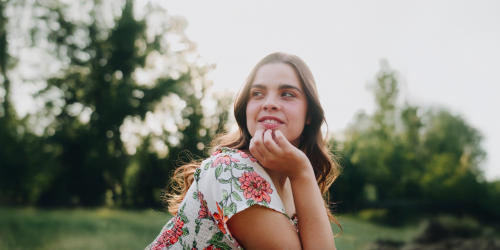
Fiorella Oudri
I met her on the first Sunday of summer camp, where she was placed in my cabin. That night, after the campers slept, I learned Amina was the youngest daughter of a refugee family fleeing unrest in Congo. Imagining all she had endured, I felt compelled to love her as much as I could in our seven days together.
As the week went on, she continued asking for oranges at every meal, sitting silently during worship and holding my hand everywhere. I longed to make her feel safe, but the other campers did not share my sentiment. They noticed her differences—how she looked, what she brought, what she ate—and treated her as an outsider. They made cruel remarks about her language, the way she only ate oranges, and how she always needed to hold a counselor’s hand. I was shocked at their ignorance and unwillingness to understand her. It broke my heart and twisted it with anger. I saw Amina’s struggle, yet they had already decided how to treat her without even knowing her. That moment deepened my awareness of how discrimination, whether from ignorance or choice, has lifelong effects.
Discrimination, inequality, and injustice have persisted throughout history. If we want solutions, we must start with how we treat people. George Saunders’ The Semplica-Girl Diaries highlights this through Eva, a young girl horrified by the accepted practice of renting impoverished women as decorations. While others justified it as normal, Eva resisted and freed them, showing how injustice thrives when people accept it instead of challenging it.
Much of society thinks like Eva’s father—overlooking injustice because it is common. But justice means refusing to let oppression become normal. It starts by recognizing that those suffering are humans, deserving of kindness. Economic and social inequalities also widen due to discrimination. In Born on Third Base, Chuck Collins illustrates privilege as the wind at a cyclist’s back—those with it move forward effortlessly, while those without struggle against it. Many seeking a safer home or better opportunities face lower wages and harsher conditions simply because of their background.
I caught a glimpse of this when I discovered I wouldn’t be paid for my summer camp job due to my visa status. It felt unfair—I worked tirelessly, led a cabin 24 hours a day, and pushed through exhaustion. But I realized that for many, this wasn’t just a summer hardship; it was their reality. Racial wage disparities persist, widening the wealth gap. Once again, society looks past the person and determines worth by skin color.
So how do we fight inequality? By recognizing the struggle, treating people with empathy and choosing justice over convenience. If we educate younger generations about race, class and economic disparities, advocate for financial and educational equity, and commit to kindness, we can shift the norm. Zechariah 7:9-10 reminds us: “Judge fairly, and show mercy and kindness to one another. Do not oppress widows, orphans, foreigners, and the poor.”
If society lived by this, the world would be better—for the oppressed, the discriminated, and for little Amina, who ate oranges for dinner.
Fiorella Oudri is an Andrews University sophomore and pre-physical therapy major. A longer version of this article was published in the university’s national award-winning student publication, Envision magazine.